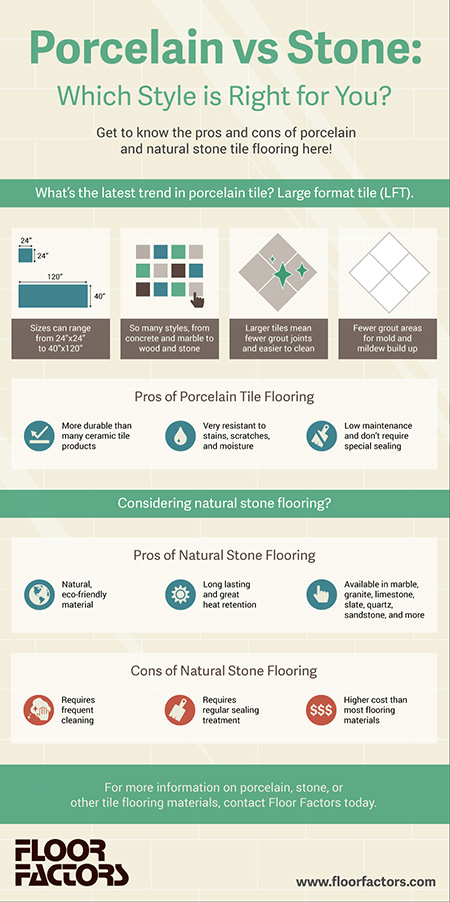 NATURAL STONE
NATURAL STONE
Natural Stone flooring can be made from a variety of different earth-sourced materials and is available in marble, granite, limestone, slate, quartz, sandstone, and onyx. Stone tile has been used for centuries and is created from mountain-born mineral substances that are sturdier than most Synthetic flooring materials. Natural stone is a versatile material known for its beauty and durability. Stone tile flooring will vary in terms of color, composition, and texture. The material is scratch-resistant, although not as resistant as porcelain and needs to be cleaned frequently.
Natural stone tile is easy to match with virtually any decor and adds a timeless look to indoor or outdoor residential and commercial spaces.
Whether you’re looking to install a new tile floor, countertop, or accent wall in your home or commercial space, Floor Factors offers a wide range of materials, styles, sizes, and colors to choose from, including porcelain and natural stone. Our tile flooring options are also available in a variety of shapes and patterns.
Unbeaten Versatility
In addition to flooring, tile is an excellent choice for a number of different surfaces including countertops, showers, pools, hot tubs, stove backsplashes, and fireplaces. The versatility of tile is unbeatable. Tile flooring comes in a myriad of options from sleek, modern metallics to weathered, natural stone. Decorative trims can create a custom look with endless design possibilities. Incorporating porcelain or stone tile into your home or commercial renovation will add an air of timeless sophistication and character to any space.
PORCELAIN AND CERAMIC TILE
Porcelain tile is gaining popularity in the global flooring market. It is created by firing clay with a high compacting pressure. However, the finished material is much harder and more versatile than Ceramic. In addition, porcelain tile flooring is made from refined and purified clay making it extremely dense and durable. Porcelain tile floors are harder and more resistant to scratches, deep abrasions, and thermal shock than natural stone floors. However, tile is water-absorbent and can expand in humid climates.
Porcelain tile is manufactured in either a through-bodied or glazed format. Through bodied porcelain is created from clay or sand that is fired all the way through. This type of porcelain can be finished with or without polish. Some home and business owners opt to install tile that is not polished to avoid slippery floors. Glazed porcelain tile flooring is made out of simple clay material and covered with a thin glass or ceramic layer. Glazed tile is usually more vibrant in color and can be patterned.
Porcelain tile is available in different PEI (Porcelain Enamel Institute) ratings, which indicate how durable the material is. A rating of 1 will typically indicate that the tile is not strong enough for foot traffic and is best suited for walls or countertops. A rating of 5 implies that the porcelain is extremely durable and can handle foot traffic over several years or decades. The porcelain tile offered at Floor Factors is created with polishing and glazing techniques that give homes and commercial spaces an elegant and distinguished look.
Tile Sizes
Large format tile (LFT) is gaining popularity in the flooring market. LFT is typically manufactured in 24” x 24” (or larger) porcelain and stone tile slabs. Installing large format tile into your home or commercial building will modernize the space and add depth and sophistication. Larger tiles make covering a bigger space much easier as there are fewer pieces to install. Large porcelain or stone tile flooring is also easier to clean and maintain because there aren’t as many cracks in between each tile.
Before selecting tile for your home or business, it’s important to get to know the different properties and characteristics of each available option. Some flooring materials are better equipped to hold up in high-traffic rooms, while others are a better choice for accenting a space.
Both stone and porcelain tile make excellent choices for floors, countertops, patios, and bathrooms. Porcelain tile offers the most resistance to wear and tear and lasts longer than stone tile. However, both tile options offer high levels of durability and come in a myriad style and color options. Porcelain tile is used more often for kitchen backsplashes, showers, and other small statement areas while natural stone tile can be used for virtually any residential or commercial surface.